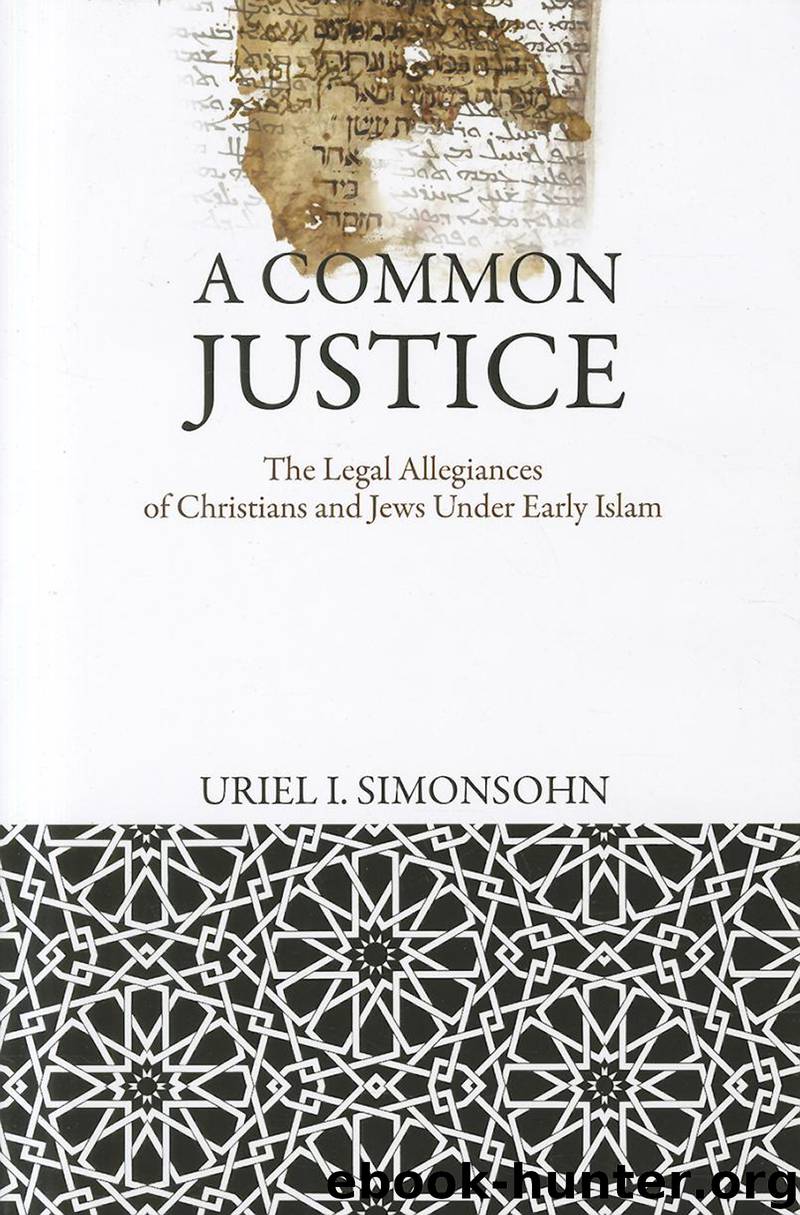A Common Justice by Simonsohn Uriel I.;

Author:Simonsohn, Uriel I.;
Language: eng
Format: epub
Publisher: University of Pennsylvania Press
Published: 2019-03-15T16:00:00+00:00
Advantages
Vigorous exhortations are a rare event in the surviving East Syrian legal literature from the Islamic period. Another way to discourage appeals to non-ecclesiastical judicial institutions was to draw attention to the advantages of ecclesiastical ones. Išō‘bokt’s regulations include references to cases in which litigants did not possess sufficient evidence to pursue their causes before “external” and “secular” judges. Such deficiencies, it seems, were not treated as severely in an ecclesiastical court:
If the claimant from the outset has no valid deed or if [the deed] is doubtful, and [if he] does not have valid witnesses or there is doubt [about them], outside judges [dayyānē men d-l-barr] do not accept his statement and do not summon the defendant to court. We, however, as we know and are convinced that [there are] many [who] give one another a thing discreetly, of which no one knows about, we accept his statement, even if he does not have a deed and witnesses, providing the claimant does not have a reputation of being dishonest, slanderous, and litigious. We adjudicate in his matter according to what is right.64
Išō‘bokt makes a similar point in cases of deficient deeds, according to which “worldly judges [dayyānē men d-‘ālmā], however, do not pass sentence.”65 Perhaps a similar concession should be discerned in the acceptance of non-Christian testimony. Let us consider first the early authority of the third-century church order, the Didascalia Apostolorum: “You shall not admit a testimony from the heathen against any of our people; for through the heathen the Enemy contrives against the servants of God…. For the heathen are not to know of your lawsuits, and you shall not admit the testimony from them against yourselves.”66
In contrast to this explicit stipulation, Timothy’s position with regard to a Muslim’s testimony may appear surprising at first glance: “If [the Muslim witnesses] are God-fearing and faultless, then their testimony should be accepted, be it in a matter pertaining to a debt or another matter. Yet if they are not God-fearing, then their testimonies should not be taken, especially regarding a matter of belief.”67 The attribution of reliability to non-Christian testimony could have resulted from the fact that Christian testimony was not always available. Were an ecclesiastical judge to deny the testimony of non-Christians, litigators would be obliged to take their lawsuits elsewhere.
Whereas certain regulations were meant to exploit the limitations of a competing legal order as a means to attract litigants, other regulations suggest an attempt to disadvantage those who appealed to a nonecclesiastical judicial institution. The manner in which ecclesiastical legislators sought to prevent marriages from being conducted outside the church, discussed in Chapter 3, should be seen in line with their efforts to enable litigants to litigate on account of deficient bills. In the latter case, an argument was made for litigating before an ecclesiastical institution because of its procedural leniency; but in the case of marriages, legal arrangements conducted before nonecclesiastical authorities lost their validity within the ecclesiastical jurisdiction.
Download
This site does not store any files on its server. We only index and link to content provided by other sites. Please contact the content providers to delete copyright contents if any and email us, we'll remove relevant links or contents immediately.
| Africa | Americas |
| Arctic & Antarctica | Asia |
| Australia & Oceania | Europe |
| Middle East | Russia |
| United States | World |
| Ancient Civilizations | Military |
| Historical Study & Educational Resources |
Cecilia; Or, Memoirs of an Heiress — Volume 1 by Fanny Burney(32064)
Cecilia; Or, Memoirs of an Heiress — Volume 3 by Fanny Burney(31459)
Cecilia; Or, Memoirs of an Heiress — Volume 2 by Fanny Burney(31409)
The Secret History by Donna Tartt(18170)
Sapiens: A Brief History of Humankind by Yuval Noah Harari(13993)
Leonardo da Vinci by Walter Isaacson(12807)
The Radium Girls by Kate Moore(11624)
Sapiens by Yuval Noah Harari(5125)
How Democracies Die by Steven Levitsky & Daniel Ziblatt(4965)
The Wind in My Hair by Masih Alinejad(4847)
Homo Deus: A Brief History of Tomorrow by Yuval Noah Harari(4691)
Endurance: Shackleton's Incredible Voyage by Alfred Lansing(4508)
Man's Search for Meaning by Viktor Frankl(4292)
The Silk Roads by Peter Frankopan(4275)
Millionaire: The Philanderer, Gambler, and Duelist Who Invented Modern Finance by Janet Gleeson(4105)
The Rape of Nanking by Iris Chang(4024)
Hitler in Los Angeles by Steven J. Ross(3801)
The Motorcycle Diaries by Ernesto Che Guevara(3788)
Joan of Arc by Mary Gordon(3786)
